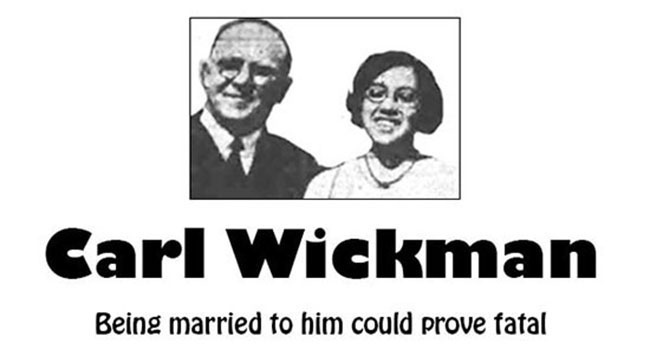| HOME • FAMILY • YESTERDAY • SOLVAY • STARSTRUCK • MIXED BAG |
 |
|
|
When Carl W. Wickman showed up at the Albuquerque, New Mexico, police station on November 25, 1933, he was distraught. His wife was dead, he said between sobs. Described as a pudgy, little man, Wickman looked older than his 34 years. (The first article below describes him as 45 years old.) He told police he and his wife had been married only a month. They had been out for a drive, he said, and had car trouble. When they got out of the car to inspect the vehicle, Mrs. Wickman was struck by a passing automobile. The driver did not stop. Police were sympathetic with the nerdy looking newlywed who had flagged down another vehicle, this one driven by a man who agreed to take Wickman and the body of his wife to Albuquerque, about ten miles away. Wickman said he was a druggist, moving to New Mexico from Denver. Police didn't press him with many questions, allowing Wickman to spend the night at the station, where he dozed off in a chair. The next morning, Wickman was taken to a hotel, while police looked for the driver of the hit-and-run car. At the hotel, Wickman made his first mistake — he asked the receptionist for a pen and paper; he wanted to write to the Federal Insurance Company in Chicago to begin the process of collecting on a $1,000 policy he had taken out on his wife's life. When the story of the fatal accident reached newspapers around the country, it was read by some folks who were certain Wickman was lying. Two of those people were George and Frank Keith, in Denver, who went to the district attorney's office to say their mother, Mrs. Rhode Keith, had married Carl Wickman four years earlier, and a short time later, in July, 1930, she died, mysteriously, after drinking an orangeade prepared by her husband, who worked in a drug store in suburban Brighton, Colorado. Wickman had insured this wife's life for $2,000. And in the tiny town of Vici, Oklahoma, Dewey County Attorney Ralph Gilchrist thought about Marie Burns, a local girl who had married Carl Wickman in 1931, and died shortly thereafter in Holbrook, Arizona. Three wives in four years — all dead. When confronted, Wickman acknowledged the deaths of the three women, but claimed he was not responsible. He claimed he was simply unlucky with his wives. He even mentioned another wife — his first, Mina Mohr — and said she was dead, too. Not his fault, he added. But Mina Mohr Wickman wasn't dead. She was alive and well in Edmond, Oklahoma, where she had been abandoned by her husband in 1927, just after the birth of their son, Fred. At the time Mrs. Wickman didn't realize how lucky she was. What happened next to Wickman was inevitable. |
|
|
|
Perhaps to prevent, or, at least, delay police connecting all three murders, Wickman stuck to his story about striking wife number four with a tire iron. Prosecutors believed the truth of the matter was Wickman had poisoned her, just as he had wives two and three. He then placed Donalda Chicoine's body in the road, after dragging it to damage her clothes and her face to make them look as though the woman had been hit by a car. The final touch was the blow on the head from the tire iron. |
|
|
|
Wickman received a stay of execution, pending an unsuccessful appeal. However, he was not executed. According to the 1940 U. S. census, he was still an inmate at the state penitentiary in Santa Fe. One of the strangest findings of investigators was a stash of love letters Wickman had received from women over the past few years. He seemed a man unlikely to appeal to many women, but one of his pen pals called him, "You glorious sheik!" Another wrote, "Just give me a month with you, sweetheart, and I could make you love me forever." The letter-writer had no clue that one month is about all Carl Wickman gave any woman after he walked out on his first wife. |
|
| HOME • CONTACT | |
